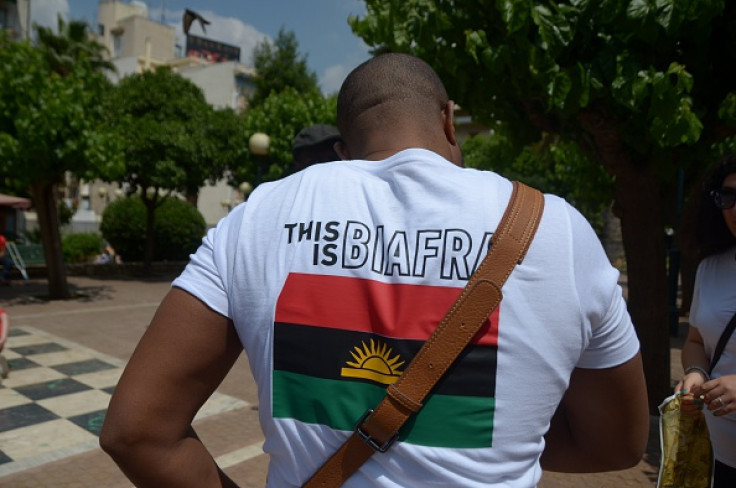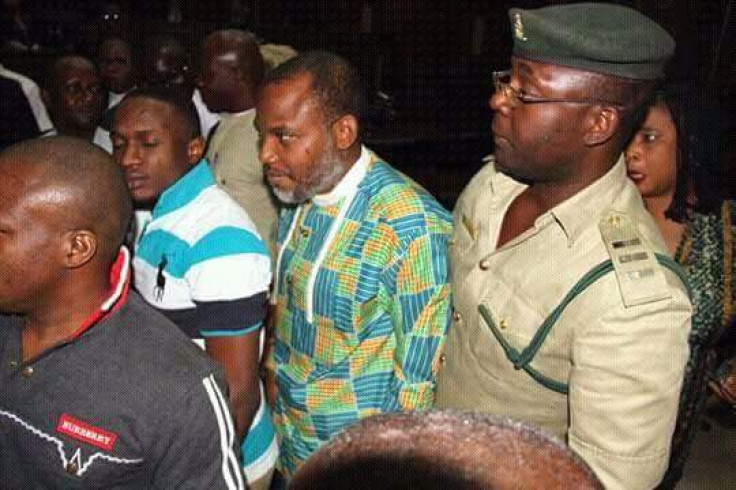Nigeria: Niger Delta militants alliance appears impossible as 'we are all Biafrans'

As suspected ex-militants from the Niger Delta region, southern Nigeria, have allegedly threatened to kill the crew of a hijacked ship if the Nigerian government does not release pro-Biafran leader Nnamdi Kanu, rumours are spreading that pro-Biafran separatists might join forces with Niger Delta groups.
Who are pro-Biafran groups and Niger Delta militants?
People identifying themselves as Biafrans call for the independence of the territories forcibly annexed to Nigeria during the British colonisation, ended in 1960. An independent Republic of Biafra was declared in 1967 and re-annexed to Nigeria in 1970 following a civil war - also known as "Biafran war" - that killed millions of people.
Pro-Biafrans hold regular marches across southeastern Nigeria demanding independence and the immediate release of Radio Biafra director Nnamdi Kanu who is awaiting trial on treasonable felony charges.
In the early 2000s, tensions between foreign oil corporations in oil-rich Niger Delta and local communities arose as some ethnic groups felt they were being exploited and could not benefit by the presence of oil in the area.
The repeated oil spills that considerably damaged the environment and affected people's health contributed to further deepen the communities' frustration. Tensions escalated and culminated in attacks, and also saw the birth of militant groups.
The Indigenous People of Biafra (Ipob) and the Movement for the Actualization of a Sovereign State of Biafra (Massob) distanced themselves from the hijacking, stressing that they are not involved in criminal activities. However, Uchenna Madu, one of Massob leaders, was also quoted by AP as saying: "Some Niger Delta militants have shown interest in working with us."
There are no militants, only Biafran resistance
Ikechukwu Okoye, Ipob coordinator in Anambra state, told IBTimes UK that the term "Niger Delta militants" is allegedly used by officials to smear the reputation of people who fight for independence. "Niger Delta Militants are Biafrans agitating for what is rightly theirs to own," he said.
"Biafraland is being polluted and at the verge of utter destruction by the activities of oil companies, that care less about our welfare. Yet the [Nigerian] government has never deployed a considerable amount of money towards the rehabilitation and empowerment of our people," Okoye continued.
"So, Niger Delta militants – as they are called – cannot be joining forces with Biafrans because they too are Biafrans. They have come to terms with the realization that their very interests will be protected only in their father land, Biafra."
Immanuel Yaghozie, editor of Biafra 24, told IBtimes UK that groups in Niger Delta are "Biafrans resisting occupation." He said: "Niger Delta militants is a political term created by our oppressor to divide the great people of Biafra. No sensible person should question their 'Biafran-ness.' It's their ancestral land as long as we can remember. We have owned and resided on this piece of geography and real estate as our fathers did, centuries before the colonial overlords grabbed up Africa for breakfast.
"We make neither peace nor war with Nigeria in Biafra. We do not have to go to war with anybody over Biafra, we have the right to Self Determination and that is exactly what the people are doing, resisting oppression."

Intelligence point of view
Intelligence consultant David Otto, CEO of UK-based TGS Intelligence Consultants, urged the Nigerian government to pay more attention to the Biafran agitation and solve the problem of Kanu's detention.
He told IBTimes UK: "The incident shows that the Nigerian government has not understood yet that the Biafran secessionist movement should be taken seriously. A link between the Niger Delta militants and some pro-Biafrans is being established and Kanu's prolonged detention will further put the country in jeopardy.
"Niger Delta militants saw Kanu's detention as an opportunity to make demands," he continued. "They took advantage of the fact that a separatist leader is being detained. Nigeria does not have the means to face Boko Haram in the north as well as Niger Delta and pro-Biafrans in the south."
Governemnt's response
Speaking to IBTimes UK, defence spokesperson Rabe Abubakar said the identity of the hijackers and the hostages on the hijacked ship was still unknown. "I can confirm the incident happened," he said, adding the hijacking did not occur in Nigerian waters. It is believed that the Liberian-flagged, Greek-owned MT Leon Dias was seized near the Port of Cotonou, Benin.
"Whoever is behind this – individuals or groups – committed an act of sabotage. We are dealing with the government of Benin and we are working to ensure that the safety of those on board remains intact."
The Nigerian government has not made any comment regarding the ship hijacking. During a media chat in December 2015, President Muhammadu Buhari said Kanu would not be released due to the "atrocities" allegedly committed. He added he was not worried about the Pro-Biafran movement.
In a previous interview with IBTimes UK, government's spokesperson Mike Omeri said Nigeria did not consider the separatist movement a threat to the current leadership, and defined pro-Biafrans as an "insignificant number of frustrated people who are not a threat to the existence of Nigeria".
Nigeria up close: Check out our Flipboard magazine
© Copyright IBTimes 2024. All rights reserved.






